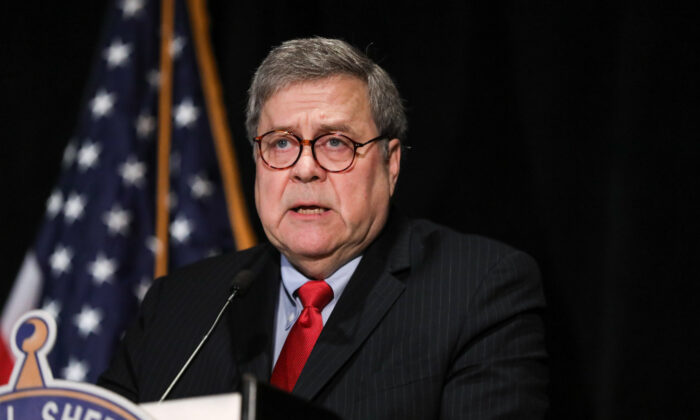Attorney General William Barr reiterated on Thursday the importance of supporting America’s men and women in blue amid a rise in police officer attacks and death by suicide.
Barr said in an address to law enforcement officers in Florida that the United States has a “moral obligation” to support the wellbeing of law enforcement who are facing an uptick in challenges over recent years to keep Americans safe. He added that the Trump administration is committed to counteracting and surmounting the problems.
He underscored that the role of a police officer comes with a great degree of danger, which is exacerbated by the “emergence of a deeply troubling attitude towards police,” where people try “to scapegoat and disrespect police officers” or “disparage the vital role” police officers play in society.
Police officers are facing a rise in attacks in recent years, including physical attacks, Barr reiterated, highlighting that assaults against officers have jumped about 20 percent to about 60,000 assaults per year. Moreover, 106 officers died in line-of-duty incidents in 2018, according to FBI data. The number of incidents last year rose to 134 officer deaths, Barr said.
Along with attacks, officers are also required to combat a number of incidents that stem from a range of social pathologies, including mental illnesses, broken homes, and drug abuse, that could inflict serious trauma on the officers, as well as leading to stress-based physical health problems such as high blood pressure.
“Officers are seeing the worst side of society. What they are seeing today is worse than ever. And they are seeing it more often,” he said during the International Association of Chiefs of Police Officer Safety and Wellness Symposium.
The attorney general also repeated his concerns about the rise in police deaths by suicide, saying that the rate of suicide among law enforcement and firefighters is 40 percent higher than the national average. Nationwide, the risk of suicide among police officers is 54 percent greater than other workers (pdf), according to a 2019 analysis of the Centers for Disease Control and Prevention data presented by Dr. John Violanti, who researches police stress and suicide.
He added that at least 228 officers had taken their own lives in 2019—a 44 percent increase from a year before.
“These are staggering statistics. A lot more must be done. Our men and women who wear the badge are some of our country’s strongest and bravest people. And like the rest of us, there are times in their lives when they need support,” he said. “We have a moral obligation to do all we can to support the men and women who keep us safe.”
In January, Barr launched a national commission aimed at addressing the problems confronting law enforcement that impact their ability to police in the community, known as the Presidential Commission on Law Enforcement and the Administration of Justice, under the direction of President Donald Trump. One focus of the commission would be to study the challenges that law enforcement officers face associated with their mental and physical health, such as police officer suicide.
The administration has also taken other steps to address the issue of police suicide, including signing the bipartisan Supporting and Treating Officers in Crisis (STOIC) Act, which provides funding for suicide-prevention programs and mental health services for police officers.
While expressing his concerns about police suicide, Barr shared a personal story about a social worker who helped his family during his daughter’s cancer battle, encouraging law enforcement and veterans to seek help when needed.
“Everyone goes through a period where they have some difficulty and could use support,” he said.
He described his experiences where a social worker was assigned by a Boston hospital to help his youngest daughter Meg and family get through the hard time.
“My immediate impulse was, ‘Hey, we’re a strong family, we don’t need a social worker,’” he said, but added that, “she was one of the greatest things to happen to us during this six month period when we were up in Boston.”
“She is just a godsend,” he added. “So I understand the instinct to say that we don’t need the help, but that’s one of the things that we need to work on overcoming in the law enforcement community to address this problem.”
He added that support for law enforcement also needs to come from the American people as well, suggesting that there was a need to show more respect for officers.
“We should be showing our police officers the same gratitude we show our soldiers,” he said. “Soldiers protect our people by fighting our enemies abroad, while the police protect our people by guarding them here at home.”
Barr, who is known for his tough-on-crime approach, has repeatedly defended police officers in speeches and op-eds in the past.
This article is from the Internet:Barr Says US Has ‘Moral Obligation’ to Support Wellbeing of Police Officers
